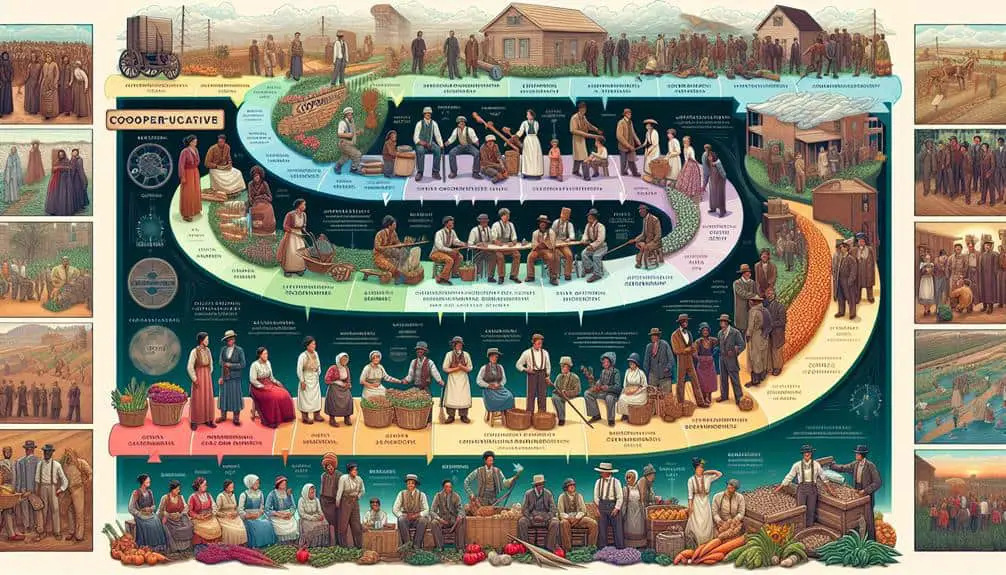Co-Op history and culture are essential as they reveal collaborative economic models, provide alternatives to traditional business structures, and empower individuals through shared resources. They lead to increased stability, sustainability, and economic growth in various sectors. Exploring the cultural diversity within co-ops uncovers a tapestry of values, fostering understanding and innovative problem-solving. Integrating co-op history into curriculum broadens perspectives on the cooperative movement and its enduring impact. By fostering community spirit, co-ops cultivate unity and resilience. Engaging activities like workshops and historical reenactments offer immersive experiences. Discover more about the significance of co-op history and culture.
Key Points
- Co-Op history showcases collaborative economic models and alternative business structures for empowerment and sustainability.
- Cultural diversity in co-ops fosters understanding, innovation, inclusivity, and equity.
- Integrating co-op history in curriculum enhances learning, broadens perspectives, and addresses contemporary challenges.
- Co-Ops foster community by cultivating relationships, shared values, collaboration, and overall well-being.
- Engaging activities in co-op history include workshops, games, projects, reenactments, and field trips for experiential learning.
Benefits of Co-Op History Studies
Studying the history of cooperatives provides valuable insights into the evolution of collaborative economic models and their impact on society. Cooperatives have a significant economic impact by offering an alternative to traditional business structures. They empower individuals by pooling resources and sharing risks, leading to increased stability and sustainability. By examining the development of cooperatives over time, one can understand how these models have contributed to economic growth and resilience in various industries.
Furthermore, delving into co-op history sheds light on the vital role these organizations play in promoting social justice. Cooperatives are often founded on principles of equality, democracy, and solidarity, aiming to address social inequalities and empower marginalized communities. Through cooperative efforts, individuals can collectively address societal challenges, advocate for fair labor practices, and create opportunities for those who've been historically disadvantaged.
Exploring Cultural Diversity in Co-Ops
Exploring the cultural diversity within cooperatives reveals a rich tapestry of traditions, values, and perspectives that contribute to the unique fabric of cooperative communities. Cultural exchange plays a crucial role in co-ops, allowing members to learn from one another's backgrounds, customs, and beliefs. This exchange fosters a deeper understanding and appreciation for diversity, enriching the cooperative experience.
Solidarity building is another key aspect influenced by cultural diversity in co-ops. When individuals from various cultural backgrounds come together to work towards a common goal, they form strong bonds based on mutual respect and cooperation. These bonds create a foundation of unity within the cooperative, enhancing communication, collaboration, and overall success.
Moreover, cultural diversity brings a range of ideas and approaches to problem-solving, leading to innovative solutions and strategies within the cooperative setting. Embracing cultural diversity in co-ops not only strengthens the sense of community but also promotes inclusivity and equity, making co-ops more resilient and adaptable in a rapidly changing world.
Integrating Co-Op History Into Curriculum
The historical foundation of cooperatives serves as a valuable educational resource that can be effectively integrated into curricula to provide students with a thorough understanding of cooperative principles and practices. When integrating co-op history into the curriculum, consider the following:
- Curriculum Integration: Incorporating co-op history into various subjects can help students see the practical application of cooperative principles in different contexts, enhancing their learning experience.
- Student Engagement: Bringing historical context into lessons can spark students' interest and curiosity, fostering a deeper connection to the material being taught.
- Historical Context: Understanding the origins and evolution of cooperatives provides students with a broader perspective on the cooperative movement and its significance in shaping economic and social structures.
- Modern Relevance: By exploring how historical cooperative practices are still relevant today, students can grasp the enduring impact and potential of cooperatives in addressing contemporary challenges.
Fostering Community Through Co-Ops
To cultivate a sense of belonging and interconnectedness within communities, cooperative organizations play an essential role in fostering relationships and promoting shared values among individuals. Community building is at the core of co-ops, encouraging collaboration efforts that go beyond simple transactions. By establishing a cooperative environment, these organizations create spaces where members can connect on a deeper level, sharing resources and knowledge for the collective benefit.
Through collaboration efforts, co-ops not only serve as economic entities but also as social hubs that bring people together based on common goals and principles. The emphasis on community building within co-ops strengthens social ties and enhances a sense of unity among participants. By engaging in shared decision-making processes and working towards common objectives, individuals within co-ops develop a strong sense of community and mutual support. This interconnectedness fosters a culture of inclusivity and cooperation, ultimately contributing to the overall well-being and resilience of the community.
Engaging Activities in Co-Op History
Co-ops have historically engaged in a variety of interactive and educational activities that have enriched the understanding and appreciation of their shared history. These activities haven't only provided valuable insights into the cooperative movement but also fostered a sense of community among members.
Here are four engaging activities commonly found in co-op history:
- Interactive Workshops: Co-ops often organize workshops where members can actively participate in discussions, group activities, and skill-building exercises related to cooperative principles and history.
- Educational Games: Through games and simulations, co-op members can learn about the challenges faced by early cooperatives and how they overcame them, creating a fun and engaging learning experience.
- Hands-On Projects: Engaging in hands-on projects allows members to experience firsthand the values of cooperation, teamwork, and shared decision-making that are fundamental to the cooperative movement.
- Immersive Experiences: Co-ops sometimes offer immersive experiences, such as historical reenactments or field trips to significant cooperative sites, to deepen members' connection to their cooperative heritage. These experiences bring history to life in a memorable and impactful way.




